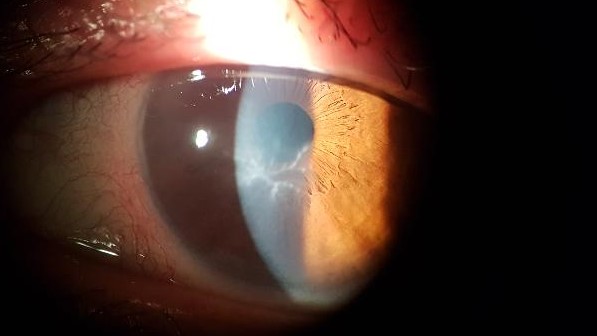
Herpes simplex virus is a viral infection that has a special predilection for the lips and eyes (HSV type 1) or for the genital area (HSV type 2), producing the typical blisters.
It is a virus that usually lives among us, it lodges in the neuronal ganglia and remains dormant. It is under stress or, depression of our immune system, when it can resurface
It can also be lodged in the corneal nerve endings or the periocular skin, until a time comes when it manifests and causes the typical painful sores.
To our ophthalmology consultation, patients frequently come with intense eye pain, inflammation of the eyelid, discomfort with light or photophobia. They also have symptoms such as decreased visual acuity or eye redness. Most often, these symptoms appear suddenly and intensely, unrelated to any foreign body or ocular trauma.
When the ophthalmological exploration is carried out, an image can be seen in the corneal stroma in a tree-like shape (in the form of tree branches). This is an image so typical of this pathology, that just by seeing it, it can be diagnosed 100% with certainty. It can be associated with follicular conjunctivitis, anterior uveitis and there may also be associated blepharitis or inflammation of the eyelids, showing small blisters on the skin filled with a transparent or serous liquid.
Early treatment is very important for your speedy recovery. If this is not done, it can progress to corneal perforation. In patients with frequent recurrences of Herpes Ocularis, it is sometimes necessary to resort to a corneal transplant, due to the formation of corneal scars or corneal glaucoma that cause decreased vision and irregular astigmatism.
The treatment is usually an antiviral (Acyclovir or Valaciclovir) in ophthalmic ointment five times a day for three weeks and a pupil dilator so that the eye is at rest and reduces discomfort.
Patients with recurrent episodes of Herpes Ocular in short periods of time, should also take antivirals orally, to reduce the frequency of recurrences. When this treatment is necessary and it is also prolonged in time, it is necessary to carry out a blood test to verify that the renal function is not affected.
The usefulness of L-Lysine in the treatment to control Herpes Simplex infection has been scientifically evidenced. It is an essential amino acid, which has a structure very similar to Arginine. This is essential in the composition of Herpes. When introduced into the diet as a supplement, Herpes binds to it instead of Arginine, which slows down the infection and its recurrence. That is why I insist on remembering how important it is to go to the ophthalmologist’s consultation when you have eye pain. Only the Ophthalmologist as a specialist is trained to correctly diagnose and treat this pathology. When you go to other specialists, pharmacists, or professionals who are unqualified or trained in this, you are often seen to prescribe corticosteroids, and this causes a worsening of Herpes virus infection. When this happens and after a few days of worsening vision and pain despite poorly treated treatment, it is when the patient desperately comes to the Ophthalmologist`s office


Recent Comments